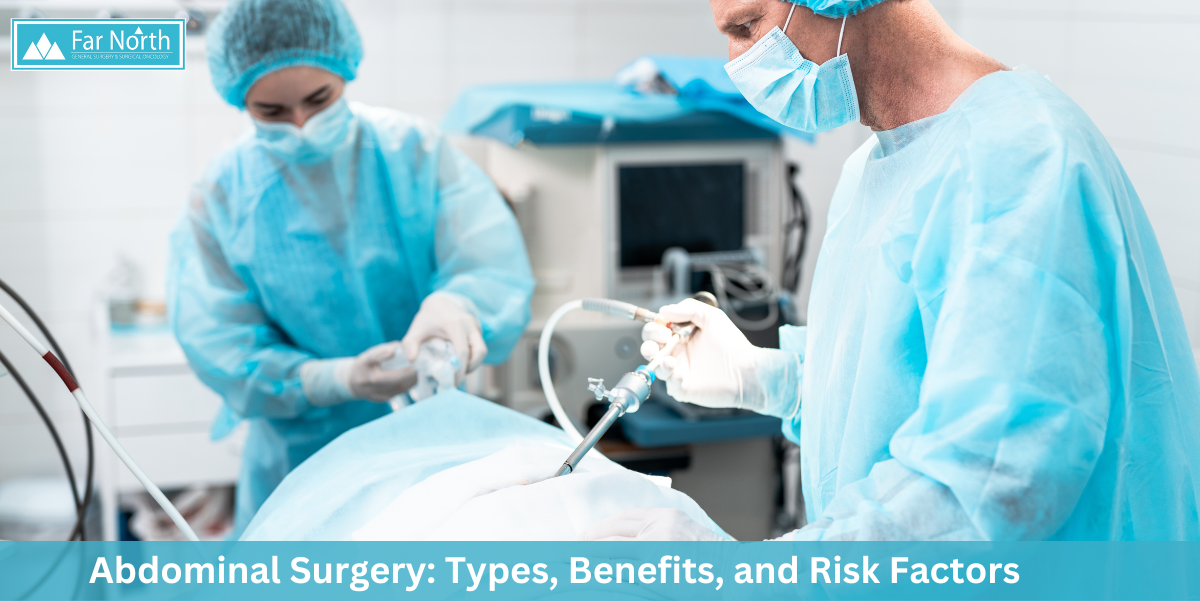Abdominal surgery, often referred to as laparotomy, is a surgical incision in the abdominal cavity that can be performed on various organs in the abdomen. Data from the American College of Surgeons (ACS) stated that 4 million abdominal operations are performed yearly in the United States. A surgeon performs a laparotomy to explore the source of problems like unexplained abdominal pain or abdominal bleeding.
This blog will provide information on the types of abdominal surgery, and its underlying causes, explain its benefits, and tell you when to consult a doctor.
Types of Abdominal Surgery
Here's a brief look at some of the common surgeries in the abdomen, based on the affected area:
- Appendectomy: Involving the removal of the appendix.
- Cholecystectomy: Removal of gallbladder, often to treat gallstones and gallbladder problems.
- Hernia Repair: Hernia, or bulging out of tissue or organ through a weak abdominal wall spot, is surgically repaired.
- Colectomy: Surgical process requiring the removal of all or a portion of the colon.
- Bowel Resection: Removes part of the small or large intestine to treat conditions like colorectal cancer, Crohn's disease, and diverticulitis.
- Gastrectomy: The procedure involves the removal of all or part of the stomach, often to treat stomach cancer or ulcers.
- Liver Resection: Affected part of your liver by tumors, cysts, or other liver diseases is removed. It's also known as hepatectomy.
- Pancreatic Surgery: The Whipple procedure to treat pancreatic cancer, cysts, and other small intestine and bile duct issues.
- Bariatric Surgery: Surgeries such as gastric bypass or gastric banding to help treat obesity.
- Organ Transplantation: In some cases, diseased or non-functional organs like the liver, kidney, or pancreas are replaced.
Examining Underlying Medical Conditions
Some of the common underlying medical conditions of surgery in the abdomen include:
- Appendicitis: The inflamed, swollen, or infected appendix attached to your large intestine is removed by surgery. An acute pain in the stomach often addresses appendicitis.
- Colon Cancer: Growth of mucosa in the inner lining of your colon leads to colon cancer, which can be treated by surgery that removes precancerous or cancerous polyps.
- Inflammatory Bowel Disease (IBD): Usually characterized by diarrhea, rectal bleeding, abdominal pain, fatigue, and unexplained weight loss.
- Internal Trauma: Internal damage to organs due to accidents or falls, resulting in internal bleeding or injuries to the liver, spleen, bowel, and intestines.
Why Is Abdominal Surgery Performed?
There are numerous benefits of abdominal surgery:
Relief in pain and internal bleeding: Many a time, abdominal surgery can provide relief from unexplained abdominal pain or internal bleeding, especially in cases where your doctor has not been able to find the source of the problem through imaging tests.
- Improved quality of life: An individual with continued stomach pain or discomfort may benefit from performing normal life functions.
- Prevent complications: Many abdominal conditions may lead to profound health implications if left untreated. Getting the surgery done prevents the problem from escalating.
- Faster recovery time: After abdominal surgery, long-term pain relief medication is given, and also most abdominal surgeries are minimally invasive procedures that generally take less time to heal than open surgical procedures.
- Reduced Infection: Abdominal surgery is usually performed in sterile conditions, so the chance of infection and other complications is minimal compared to open surgeries.
Risks and Considerations
While there are several risk factors after abdominal surgery like allergic reaction, internal bleeding, blood clots, etc., these risks can be managed. However, risk factors to consider before and after abdominal surgery are:
Potential Complications
These complications may include:
- Infection: Infections such as redness, warmth, pain, or swelling may occur at the surgery site.
- Blood Clot: Inactivity after abdominal surgery may form a blood clot in the legs, which can travel to the lungs.
- Bleeding: Although the steps taken, it can sometimes cause bleeding during or after the surgery.
Pre-Operative Complications
For safe, efficient, and optimal benefits, following some measures before the surgery will be effective:
- Physical Assessment: A comprehensive evaluation of an individual's overall health, medical considerations, and lab tests to understand the cause.
- Medical Assessment: Before surgery, it is crucial to consider a patient's underlying medical condition, such as diabetes, hypertension, or heart disease.
Post-Operative Care
Here are some of the critical points to consider regarding the care after surgery:
- Rest: Proper rest with adequate sleep is essential for the body to heal.
- Maintain a Healthy Diet: Avoiding oily and processed meals and consuming food with rich nutrients allow for faster healing.
- Follow-up with a Doctor: To ensure proper healing and avoid any complications, it is recommended to get a regular follow-up with a doctor.
When To See a Doctor
Here are some of the critical symptoms when you need to consult a doctor post-abdominal surgery:
- Persistent or worsening pain
- Changes in bowel habits
- Unexplained weight loss
- Mass or lump in the stomach
- Problems or discomfort with urinating
- Fever or chills
- Redness around your incision
Final Thoughts
Persistent abdominal pain can lead to serious health complications, especially if other abdominal disorders accompany the condition. Hence, consulting your doctor is important to make an informed decision. Your healthcare practitioner will guide you regarding your condition and will advise an abdominal surgery if required to treat your abdominal issues. Remember, consulting your doctor and opting for surgery improves the chances of a successful outcome and smoother recovery.
Visit Far North Surgery for Your Abdominal Health
Far North Surgery in Anchorage, Alaska offers effective surgical procedures for a variety of abdominal disorders. Our team of highly experienced and board-certified experts is led by Dr. Madhu Prasad, who has expertise in performing abdominal surgeries with successful outcomes.
If you are looking for high-quality surgical treatment for your abdominal issues, contact us today to get an appointment and start your journey towards better health.


